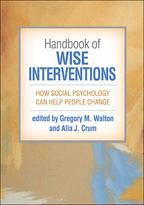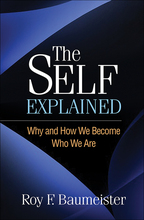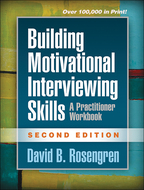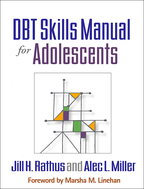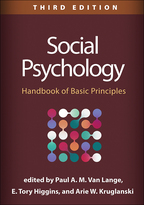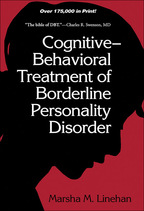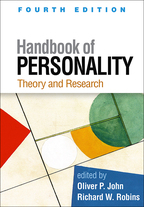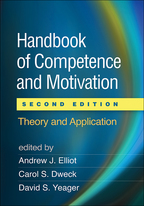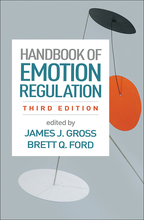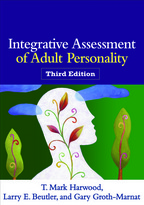Handbook of Wise Interventions
How Social Psychology Can Help People Change
Edited by Gregory M. Walton and Alia J. Crum
HardcoverPaperbacke-bookprint + e-book
Hardcover
orderNovember 10, 2020
ISBN 9781462543830
Price: $63.00 474 Pages
Size: 7" x 10"
Paperback
orderOctober 4, 2022
ISBN 9781462551002
Price: $42.00474 Pages
Size: 7" x 10"
Read a Q&A with featured author, Gregory M. Walton!
“In the last decade, researchers from across psychology have been developing and testing a new generation of theory-guided brief interventions that are changing behaviors of hundreds of people at a time. These 'wise' interventions effectively alter the ways people think about themselves, their studying or eating habits, their marriages, and their health. The outcomes are usually objective and meaningful, and often last for years. From leading researchers in the field, this is the kind of book that has the potential to change the lives of undergraduates, graduate students, and even faculty who yearn to make a difference in the world and who also want to discover new insights about people, institutions, and culture.”

—James W. Pennebaker, PhD, Regents Centennial Professor of Liberal Arts and Psychology, The University of Texas at Austin
“This volume highlights innovative interventions and provides behind-the-scenes commentary from their developers. It is indispensable for anyone who wants to use psychological science to change behavior for the better. Each chapter explains a research-based approach to enhancing motivation or changing behavior, and discusses why it works, for whom, and under what conditions.”

—Angela Duckworth, PhD, Founder and CEO, Character Lab; Christopher H. Browne Distinguished Professor of Psychology, University of Pennsylvania
“It’s not often that the world’s leading experts on the psychology of changing behavior and improving well-being come together to share their knowledge. This book presents the latest science on what it takes to promote learning, belonging, happiness, health, and peace.”

—Adam Grant, PhD, The Saul P. Steinberg Professor of Management and Psychology, Wharton School of the University of Pennsylvania
“This book is particularly useful in terms of teaching about and critically evaluating the value of psychology in the real world. Its underlying framing is quite pragmatic for different ways to organize a course. It centers both the domains of interventions and the psychological concepts underlying those interventions. Instructors using this book as a text might organize their course around domains (for example, units on health, education, relationships) or psychological concepts (for example, belonging and groups, implicit theories, reappraisal).”

—Kody Manke, PhD, Department of Psychology, Carnegie Mellon University
“I've been able to evaluate the impact of switching from journal readings to the Handbook of Wise Interventions this term in my Psychological Interventions course, an honours seminar that includes psychology majors and those going into helping professions. Students reported that they preferred this text to reading journal articles—they found the workload reasonable and the book engaging. During one-on-one meetings to help students prepare for their projects, I found they were much clearer on the concepts from the course than in previous years. They used to get to that meeting without entirely understanding what a psychological intervention even was, but now they come to it actually understanding the central course concepts—a huge win!”

—Christine Logel, PhD, Professor of Social Development Studies, Renison University College, University of Waterloo, Ontario, Canada
—James W. Pennebaker, PhD, Regents Centennial Professor of Liberal Arts and Psychology, The University of Texas at Austin
“This volume highlights innovative interventions and provides behind-the-scenes commentary from their developers. It is indispensable for anyone who wants to use psychological science to change behavior for the better. Each chapter explains a research-based approach to enhancing motivation or changing behavior, and discusses why it works, for whom, and under what conditions.”
—Angela Duckworth, PhD, Founder and CEO, Character Lab; Christopher H. Browne Distinguished Professor of Psychology, University of Pennsylvania
“It’s not often that the world’s leading experts on the psychology of changing behavior and improving well-being come together to share their knowledge. This book presents the latest science on what it takes to promote learning, belonging, happiness, health, and peace.”
—Adam Grant, PhD, The Saul P. Steinberg Professor of Management and Psychology, Wharton School of the University of Pennsylvania
“This book is particularly useful in terms of teaching about and critically evaluating the value of psychology in the real world. Its underlying framing is quite pragmatic for different ways to organize a course. It centers both the domains of interventions and the psychological concepts underlying those interventions. Instructors using this book as a text might organize their course around domains (for example, units on health, education, relationships) or psychological concepts (for example, belonging and groups, implicit theories, reappraisal).”
—Kody Manke, PhD, Department of Psychology, Carnegie Mellon University
“I've been able to evaluate the impact of switching from journal readings to the Handbook of Wise Interventions this term in my Psychological Interventions course, an honours seminar that includes psychology majors and those going into helping professions. Students reported that they preferred this text to reading journal articles—they found the workload reasonable and the book engaging. During one-on-one meetings to help students prepare for their projects, I found they were much clearer on the concepts from the course than in previous years. They used to get to that meeting without entirely understanding what a psychological intervention even was, but now they come to it actually understanding the central course concepts—a huge win!”
—Christine Logel, PhD, Professor of Social Development Studies, Renison University College, University of Waterloo, Ontario, Canada

